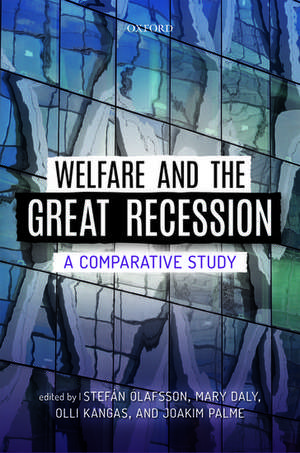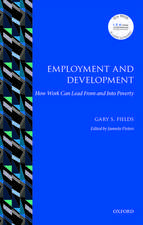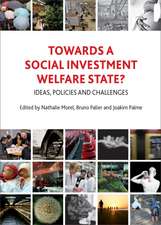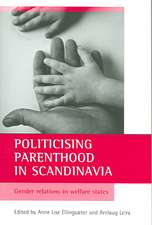Welfare and the Great Recession: A Comparative Study
Editat de Stefán Ólafsson, Mary Daly, Olli Kangas, Joakim Palmeen Limba Engleză Hardback – 21 ian 2019
Preț: 565.67 lei
Preț vechi: 809.07 lei
-30% Nou
Puncte Express: 849
Preț estimativ în valută:
108.24€ • 113.24$ • 89.92£
108.24€ • 113.24$ • 89.92£
Carte tipărită la comandă
Livrare economică 22-28 martie
Preluare comenzi: 021 569.72.76
Specificații
ISBN-13: 9780198830962
ISBN-10: 0198830963
Pagini: 352
Dimensiuni: 164 x 242 x 25 mm
Greutate: 0.65 kg
Editura: OUP OXFORD
Colecția OUP Oxford
Locul publicării:Oxford, United Kingdom
ISBN-10: 0198830963
Pagini: 352
Dimensiuni: 164 x 242 x 25 mm
Greutate: 0.65 kg
Editura: OUP OXFORD
Colecția OUP Oxford
Locul publicării:Oxford, United Kingdom
Recenzii
...the volume, replete with in-depth analyses on Greece, Spain, Ireland, Iceland, Finland, the UK, Denmark, Norway and Sweden, provides for a unique and timely reflection on European welfare state futures.
The analyses developed in this book offer an important and original contribution to our understanding of the impact of the Great Recession on different social groups and households across Europe, and of the crucial role of political choices in shaping these differential outcomes. A must-read book for sociologists, economists, and policy makers.
This excellent volume, edited by four renowned scholars, assesses countries throughout Europe, spanning cases with diverse welfare state models and recessions that struck with varied force. It tells a clear but complex story, concluding that welfare state features and specific policy responses were crucial in shaping the recession's effects on millions of European households.
In this impressive volume world-leading analysts of social policy and social inequality show that the effects of the 2007-2015 recession were very unevenly distributed, such that some "boats" sank much deeper and stayed down longer than others. Some governments made choices that enabled a quick recovery, while others made choices that prolonged the misery. Even more strikingly, the distribution of that economic misery depended strongly on social policies and political institutions. This persuasive, lively book will become an important touchstone in the comparative analysis of recession effects on inequality and foreshadows political responses to the next.
This important book traces the varying extent to which European welfare states were able to cushion vulnerable groups from the impact of the Great Recession, effectively demonstrating that comprehensive, well-funded and efficient welfare states can really work. Its in-depth, painstaking analysis of country case-studies highlights how choices made by governments are key, even where highly constrained, and brings outthe multiple challenges facing the welfare state as a political project. Essential reading.
The analyses developed in this book offer an important and original contribution to our understanding of the impact of the Great Recession on different social groups and households across Europe, and of the crucial role of political choices in shaping these differential outcomes. A must-read book for sociologists, economists, and policy makers.
This excellent volume, edited by four renowned scholars, assesses countries throughout Europe, spanning cases with diverse welfare state models and recessions that struck with varied force. It tells a clear but complex story, concluding that welfare state features and specific policy responses were crucial in shaping the recession's effects on millions of European households.
In this impressive volume world-leading analysts of social policy and social inequality show that the effects of the 2007-2015 recession were very unevenly distributed, such that some "boats" sank much deeper and stayed down longer than others. Some governments made choices that enabled a quick recovery, while others made choices that prolonged the misery. Even more strikingly, the distribution of that economic misery depended strongly on social policies and political institutions. This persuasive, lively book will become an important touchstone in the comparative analysis of recession effects on inequality and foreshadows political responses to the next.
This important book traces the varying extent to which European welfare states were able to cushion vulnerable groups from the impact of the Great Recession, effectively demonstrating that comprehensive, well-funded and efficient welfare states can really work. Its in-depth, painstaking analysis of country case-studies highlights how choices made by governments are key, even where highly constrained, and brings outthe multiple challenges facing the welfare state as a political project. Essential reading.
Notă biografică
Stefán Ólafsson is a Professor of Sociology at the University of Iceland. Educated at Edinburgh University and has a D.Phil. degree from Nuffield College, University of Oxford. He has written extensively on Icelandic society, particularly on welfare, work and social change. Professor Ólafsson is the Icelandic coordinator and a member of the steering board of the European Social Policy Network (ESPN). He has undertaken various administrative duties and commissions, including on the board of the University of Iceland, the Icelandic Council of Science and Technology, and he was the Chairman of the Board of the public Icelandic Social Security Administration from 2007 to 2017.Mary Daly is Professor of Sociology and Social Policy at the University of Oxford. Among the fields on which she has published are welfare state, gender, family and labour market, poverty. She is a member of a number of networks and boards on topics related to the welfare state, employment, family and gender and an editor of the journal Social Politics. She is the Irish Co-ordinator of the European Network on Social Policy. Her latest book is Families and Poverty - Everyday Life on a Low Income (co-authored with Grace Kelly, Policy Press, 2015). Mary Daly's research has been supported by the Economic and Social Research Council (UK), the EU, Council of Europe, ILO and UNICEF. She has over 6,400 Google Scholar citations.Olli Kangas is Professor of Practice at Turku University Finland. He was formerly Director of the Research Department at the Social Insurance Institution of Finland, Visiting Professor at Uppsala University, and H.C. Andersen Professor at the University of Southern Denmark amongst others. He is an invited member of the Finnish Academic Society for Letters and Sciences (2008-), and was previously Chair of the Editorial Board of Kela Publishing and member of editorial boards at Social Politics, Janus, Sosiologia, the European Sociological Review, and the European Journal of Social Policy. Olli Kanga's research interests focus on comparative analysis of social policy systems. Currently, he is the planner and leader of the ongoing Finnish experiment on basic income, the head of the strategic research program Equal Society, and a member of the Prime Minister's expert group on reforming the Finnish social policy system.Joakin Palme is Professor of Political Science at the Department of Government, Uppsala University, and Chairman of The Migration Studies Delegation. He was previously Director of the Institute for Futures Studies in Stockholm, and contributed to the Social Citizenship Indicator Program at the Swedish Institute for Social Research and chaired the Swedish Welfare Commission. He has published extensively on the welfare state as a strategy of equality and the politics of the welfare state.























